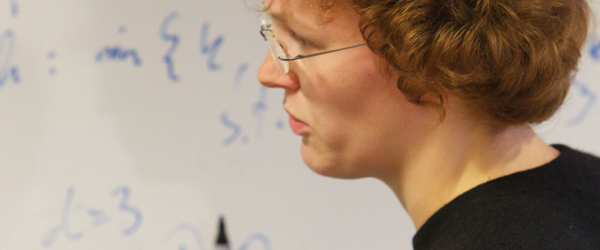Mathematics PGCE
This one year programme leads to a PGCE, recommendation for QTS and 60 credits at Master's level.
Programme overview
At the University of Bristol, we do not believe that there is only one way to teach mathematics. Effective mathematics teaching looks different from school to school and from classroom to classroom. Our role is to support you in exploring a range of perspectives, in reflecting on what works for your students, and in becoming the teacher you want to become.
How you will learn
You will find a range of ages, work experience, technological skills, mathematical interests, and mathematical expertise within the PGCE mathematics group. Our course aims to build upon the strengths of the group, supported by experienced university tutors and in-school mentors, and strongly informed by the latest developments in mathematics education research. On the course, you will learn by:
- doing mathematics together
- experiencing, observing, and experimenting with a range of classroom strategies, activities, and approaches to teaching
- observing and teaching in at least two contrasting schools (a total of 120 days in schools)
- reflecting on your own experiences and on the experiences of others
- critically examining mathematics education research literature, comparing recommendations in literature with your own experiences of learning and teaching
Experiences in school
Induction phase
Early university sessions will challenge you to explore how children experience mathematics, and how others’ experiences may differ from your own. You will develop your understanding of mathematics and the school curriculum (including A-level mathematics); of how to plan effective and enjoyable lessons, while maintaining a healthy work-life balance; of classroom management strategies; and of the needs of individual students.
You will only be assigned to your placement school after we have met you and have developed an understanding of your needs. From late September to December, you will spend most days in your first placement school. We consider you to be a teacher from the very beginning of the course; as such, you will begin teaching students very early in the placement. You will begin by teaching a small group of students.
During the placement, you will build up your timetable at a suitable pace, fully supported by two in-school mentors who will help you to develop your classroom practice: a subject mentor within the mathematics department, and a professional mentor likely outside of the department.
Assimilation phase
After your first placement finishes, you will have time back at university to reflect on and to celebrate your experiences; to develop further your subject expertise; and to reflect on future targets before your next placement. Your second placement school will be chosen to be a contrast to your first. From January to the Easter break, you will be immersed in this school, becoming an integral part of their mathematics department.
You will again be supported by two in-school mentors, and will build up your timetable load, taking your highest load between the February half term at the Easter break.
During the assimilation phase you will also have the option of becoming more involved with our Green Apple group (focusing on sustainability and climate education) and/or our decolonisation group, to explore how your teaching might take account of current global challenges.
Just before the Easter break you will complete a short primary placement, to build your understanding of how mathematics is taught at Key Stage 2.
Extension phase
After the Easter break, you will return to university. University sessions during this fortnight will be adaptive to your needs. You will then have a final placement in school. During this final placement, you will be encouraged to research areas of practice which are of particular interest to you, and will be supported to explore different teaching approaches ahead of your first year of employment.
Through the assimilation and extension phases, you will receive guidance about job applications and interviews. Many PGCE students quickly find teaching jobs within our network of placement schools.
Who this course is for
You are encouraged to apply if you are:
- a graduate who has been successful in studying advanced and abstract maths;
- and/or an individual who has experience of applying mathematics in their career.
Your degree may be in mathematics or another mathematics-related subject (such as engineering, economics, or a science). We also welcome applications from individuals who may need to complete a Subject Knowledge Enhancement course prior to the PGCE.
Contact us
Initial Teacher Education (PGCE and Lead Partner) Office
Phone: +44 117 455 1093
Email: ed-pgce@bristol.ac.uk
School of Education
University of Bristol
35 Berkeley Square
Bristol, BS8 1JA
Funding
Find out about available funding to help you get into teaching.
Your tutors
The tutors for Mathematics are Dr Alf Coles, Dr Tracy Helliwell, Elliot Malkin and Rachel Helme.
What our students say
In their evaluations of the course, our PGCE mathematics cohorts have always rated the quality of their experience extremely highly. In particular, they have praised:
- the 'massive importance' given to wellbeing throughout the year
- 'supportive and empathetic' university tutors and in-school mentors
- The 'flexibility' of the course, encouraging 'independence' and 'creativity'
- The 'engaging and reflective' university seminars
External examiners of the course have written: 'students commented on the quality of support from their subject tutors and the sustained contact that they maintained during placements. The depth of subject pedagogic knowledge of tutors was commended'.
